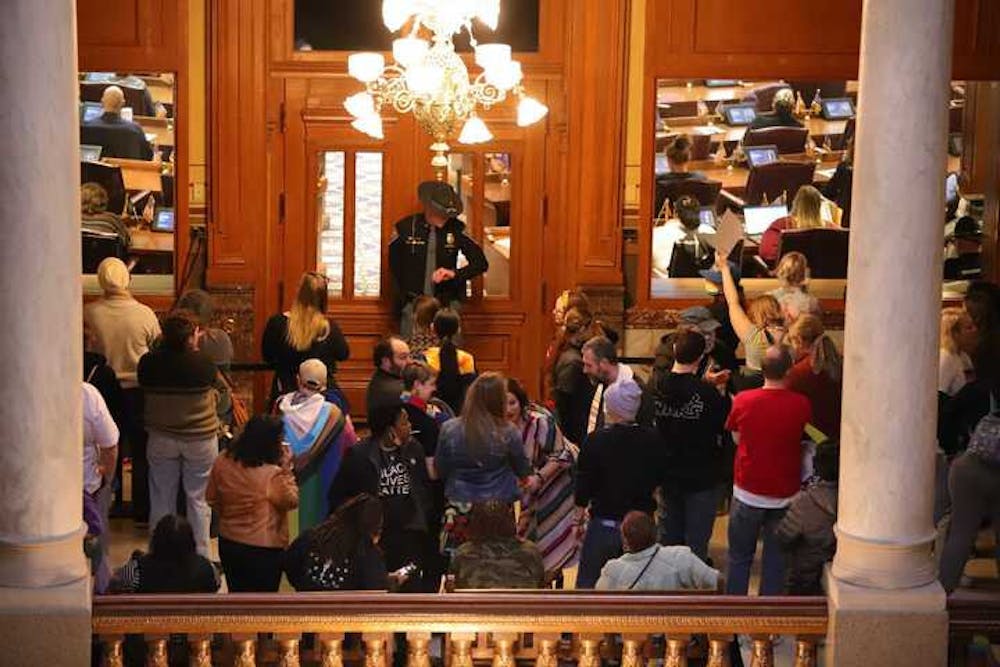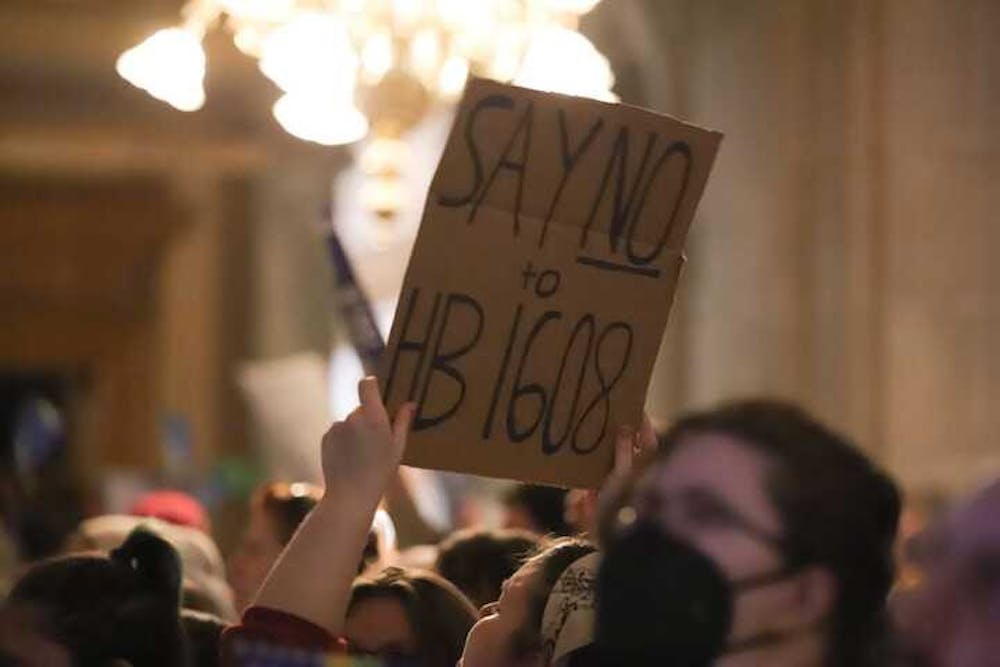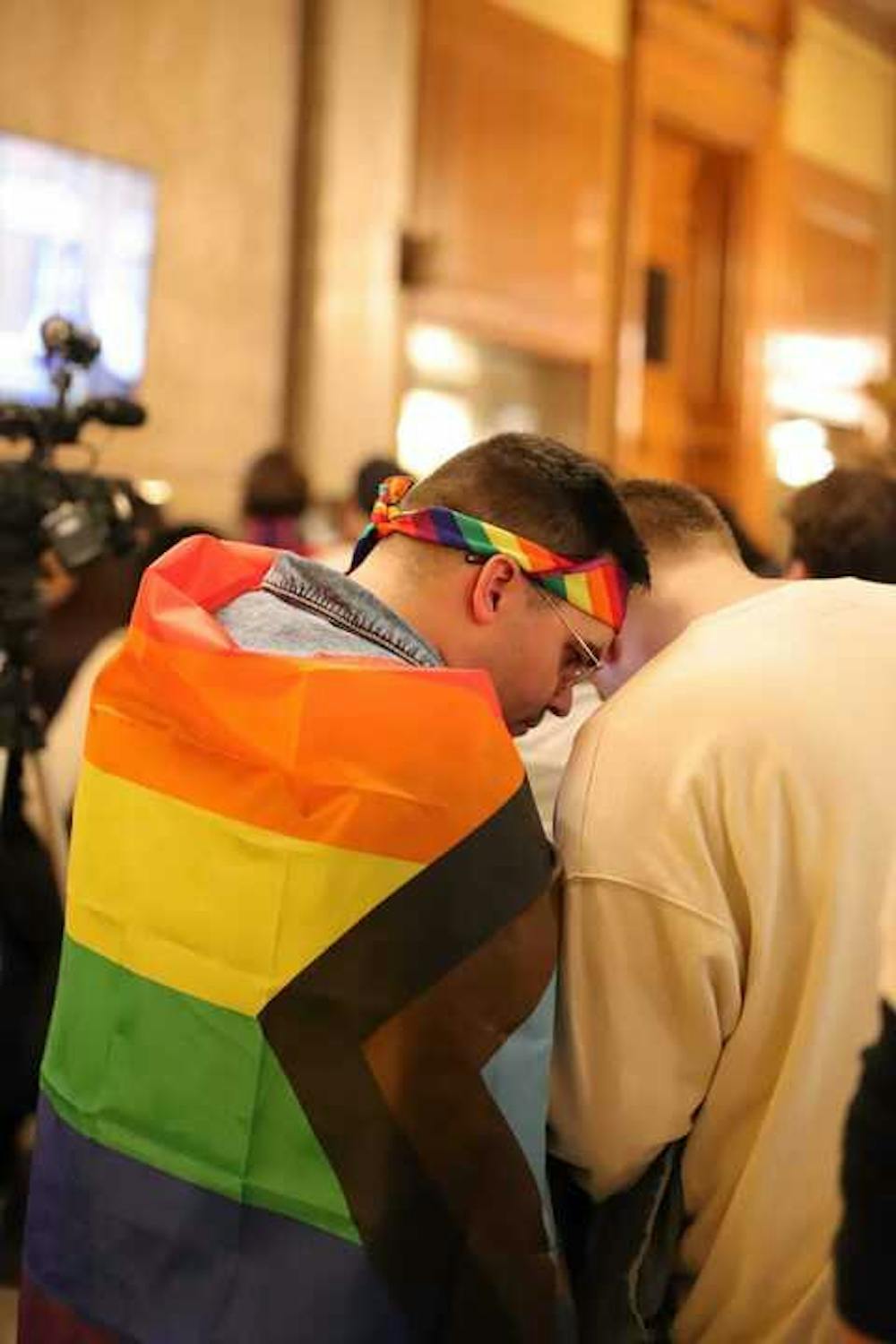On multiple levels of the Statehouse, their voices were loud. Chants rang through the building, echoed off the walls and voices fought to be heard.
“We say gay,” the voices rang.
On Feb. 20, protesters backed by the American Civil Liberties Union (ACLU) in Indianapolis turned out for the “Pack the Statehouse to Protect LGBTQ Rights” event.
The ACLU said House Bill 1608 (HB 1608) was scheduled to be heard at 8 a.m and the legislation “sends a dangerous message to these already vulnerable youth that they are a threat to public discourse.”
According to HB 1608, schools, employees, staff and third-party vendors used by schools in Indiana will not be permitted to provide instruction on human sexuality. The bill was amended in committee to say human sexuality, rather than other identifying words in the original draft. At time of publishing, the new bill had not been updated on the Indiana General Assembly website.
The bill was introduced and referred to the Education Committee, where they started hearing the bill Feb. 20.

From within the Statehouse building, approximately two hundred people cheered and boo-ed as they looked through windows and on the television at the committee hearing. Their cheers and boos echoed throughout the chamber.
Several attendees wore or carried around the color rainbow in the form of flags, sweatshirts, etc, its colors often associated with the LGBTQ+ community. The protesters chanted, “No hate in our state,” among other sayings.
They also referred to HB 1608 as a “bill of hate.”
Kristin White, Episcopal priest for the Episcopal Diocese of Indianapolis, came to the protest in support of particularly the LGBTQ+ community.
“I have heard [the bill] referred to as a slate of hate,” White said, “and I don’t believe that that’s who we are called to be in this state.”
She said part of her church’s mission is to help marginalized communities through changing systems the church believes are unjust. This bill, she said, is something she believes falls in line with injustice.
At the steps of the Statehouse, Jenny Jones and Jaimee Burris sat with their two children, one of which was holding a sign reading “Love makes a family.”
Jones was at the protest to let everyone know their family is important, and Burris thought it was important for their daughter who was holding the sign, Eliza, to see people supporting her two moms.
People against the bill far outweighed supporters. The few in favor of the bill at the protest cited children being too young to hear about gender and sexuality, as well as child safety.

Protester holds up sign in front of House Chamber at the Indiana State House on Feb. 20. Olivia Ground, DN
Julia Kathary said LGBTQ+ rights were personal to her because her daughter is transgender.
“I think that her identity is something that is at the essence of her,” Kathary said, “and it has nothing to do with legislators telling her who she can be and how she can love and how she can feel her body and live her body in reality, and she has the same rights as any of us.”
In a country with freedom of speech, she said, people shouldn’t be able to tell others they can’t talk about gender or sexuality.
“I think as part of our lives, I think that we talk about our gender or the idea of gender every day,” she said. “I think it's something we're kind of born into, it's a construct in our society. It's an expectation, a stereotype of how we're expected to live and present ourselves in the world.”
Bruce Zink brought two children with him, including his youngest Rose Grov who is transgender. Zink said Grov has benefited from support at school when it comes to their identity.
“When it comes to communicating with other kids, Rose gets really exhausted, explaining who they are and how they want to be treated to every last kid they meet,” Zink said, “and when a teacher can stand up and address the class as a whole and say, ‘Rose here is transgender and here's what that means, and it's okay and nobody freak out.’ That's a real valuable thing that takes pressure off of [them]”
Several parents brought their children to the protest, some of whom were also chanting alongside the older protesters.
Ephraim Gordon and Gigi Pyecha are both in fifth grade and in the LGBTQ+ community. Gordon is gay and Pyecha is lesbian.
When asked how she felt about the bill, Pyecha said she hates it.
“We should be able to talk about how we feel,” she said.
Her mom, Jane Pyecha, mentioned Gigi asked another girl to the school dance and Jane believed Gigi wouldn’t be able to do this if the bill were to be passed.
The ACLU posted on their Instagram during the committee hearing that language was added to HB 1608, where teachers would have to “out” transgender students to parents. This change in the bill has not been reflected on the Indiana General Assembly website by time of publishing.

Protester wears a pride flag in front of House Chamber at the Indiana State House on Feb. 20. Olivia Ground, DN.
Beverly Monts said she was protesting at the Statehouse because “it’s just the right thing to do.”
She said if children are bringing up sexuality or gender, it would “be inappropriate not to talk about it” in the classroom, adding she didn’t have the impression sexuality and gender were being implemented in lesson plans or curriculum.
Kerri Charlwood, a protester, teaches in a Title 1 public school.
“The people who are making the laws about education have no idea what's really going on in my school,” she said. “And they're trying to pass laws that would take away the ability of teachers and administrators to discuss the things that actually matter in my classroom.”
She said “kids are not trading pronouns like Pokémon cards,” and many kids in her schools deal with poverty. She added there needs to be more counselors, teachers, social workers and alternative education options. However, she said these things weren’t being talked about.
Charlwood thinks the bill is “useless.”
“It doesn't change who people are,” she said. “It just makes them feel like they should be ashamed of it. And that's not right.”
HB 1608 advanced through the education committee 9-4 and passed through the Statehouse Feb. 23. It will now go to the Senate.
Contact Elissa Maudlin with comments at editor@bsudailynews.com or on Twitter @ejmaudlin.





